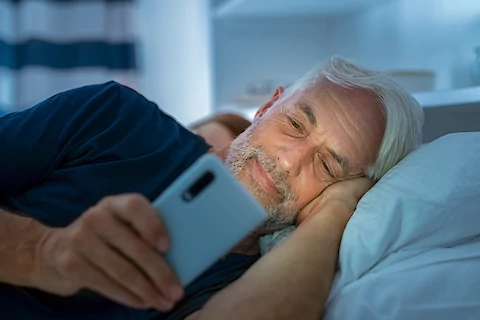
Sleep quality is a subject that affects everyone, especially seniors. What you might not realize, however, is how much something seemingly harmless - like using your smartphone before bed - could be impacting your sleep. The culprit? Blue light. This form of light, emitted by devices like televisions, computers, and smartphones, can interfere with your body's natural sleep patterns. This prevents you from getting the restful sleep you need. Senior Helpers Princeton will discuss how seniors can improve their sleep quality by reducing blue light exposure.
Understanding Blue Light
Blue light is a color in the visible light spectrum visible to human eyes, but it's not all detrimental. Sunlight, the primary source of blue light, can boost attention and mood during the day. However, artificial sources, particularly digital screens from televisions, computers, and smartphones, emit substantial amounts of blue light. These can disrupt our circadian rhythm and our internal body clock.
The Impact of Blue Light on Sleep Quality
Exposure to blue light from screens close to bedtime is problematic. It tricks your brain into thinking it's still daytime, making it harder to fall asleep. This is especially important for seniors, as sleep patterns naturally shift as we age. This often leads to earlier bedtimes and wake times. Too much blue light can exacerbate these changes, leading to poor sleep quality and overall health issues, ranging from mood disorders to chronic diseases.
Practical Tips to Reduce Blue Light Exposure
One of the best ways to improve sleep quality is to limit screen time in the evening. Try to turn off your devices at least an hour before bedtime. If this is not possible, many devices now have settings that reduce blue-light emissions. It's worth spending some time familiarizing yourself with these settings – often found in the "display" or "brightness" menu. They can often be programmed to automatically switch on during the evening, helping reduce blue light exposure without you having to remember.
Alternatives to Screen Time Before Bed
Reducing screen time before bed might leave a gap in your evening routine. The good news is there are plenty of relaxing activities that can replace the time spent on screens. Simple activities like reading a book, listening to calm music, or enjoying a gentle stroll can not only fill this time but also help your body wind down and prepare for sleep. Over time, you may even find that you enjoy these screen-free activities more, and they become a much-anticipated part of your evening ritual.
Discover Personalized Senior Care
While technology certainly has its benefits, it's important to be mindful of the potential impact on our sleep, particularly for seniors. By understanding and limiting blue light exposure and exploring screen-free activities, we can significantly improve our sleep quality.
If you live in the areas of Princeton, Plainsboro, Lawrenceville, or Pennington and would like more help managing your sleep quality, don't hesitate to reach out to us at Senior Helpers Princeton. To learn more about our senior care services, contact us today!